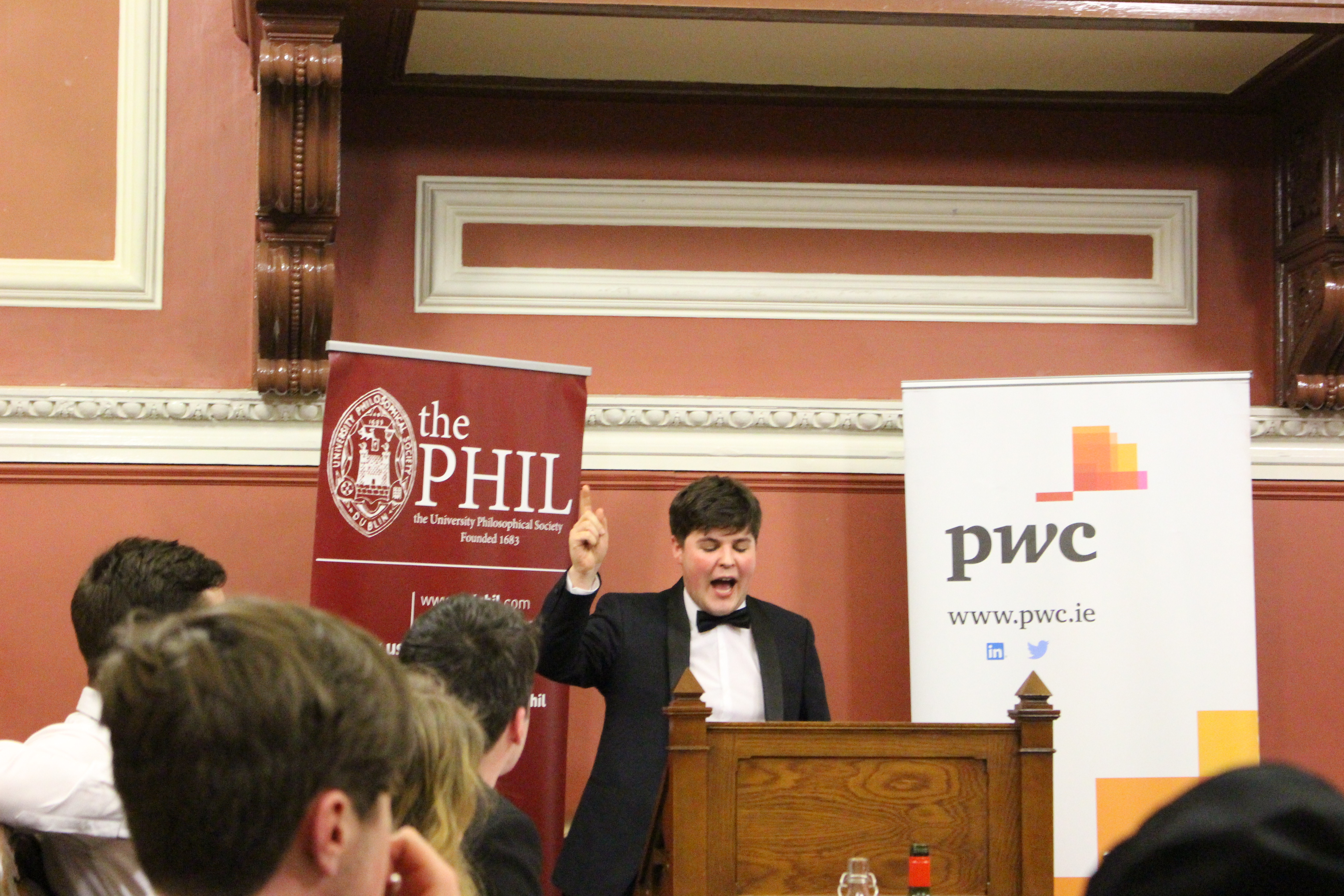The annual Eamonn O’Coinne Maidens final was held this year on Thursday November 30 at 7.30pm by the Phil. The event is named after a former Trinity student who was a talented debater, who won the Maidens debating final in 2004 but tragically passeed away in 2005. The competition encourages the finalists to emulate O’Coinne’s excellence in debating.
400 maidens entered the competition at the start of the year yet only the 8 deemed the finest by the judges remained. The finalists included Claudia Smith, James Spillane, Hugh Ó Laoide, Christina Anderson, Donnchadh Curran, Harry Hogan, Kate Duggan and Ronan Daly, debating the motion ‘This house believes that it’s better to have loved and lost’.
In the grandeur of the GMB debating chamber I began to feel a true zeal at being at such an event. The routine razzmatazz followed with table banging, a witty introductory speech by Liz MacBride and it began.
Claudia Smith, in a calm and collected tone, began the debate by defining love as an affectionate connection with someone. Yet while this love can break down, Smith argued it was simply “worth taking the risk [for]”. She proceeded to argue that if this breakdown occurs, it will be painful, yet in the years that follow we will look back on the high points of the relationship and not on “eating Ben & Jerry’s while watching The Notebook”.
To juxtapose this was James Spillane. Spillane argued that society places too much emphasis on love and it is “utter bullshit”. To Spillane, couples seem to be smug and elitist that they are in love. He contended the fact that he is “better off alone”- he can chase achievements, not love. Spillane further urged the proposition to stop claiming that life is necessarily enriched by the loss of love. He finished with the fiery but hilarious declaration: “I’d like the opposition to get off their high horse and stay in their own fucking lane.”
Hugh Ó Laoide first refuted Spillane’s contention that there is too much societal emphasis on love stating “that’s because love is fucking great”. Ó Laoide proceeded to talk of the regret one would feel in the closing moments of life if they had simply played it safe their whole life and had not loved. Ó Laoide acknowledged the fact that the pain of lost love is terrible but compared it to the pain of a hangover arguing, “but will that stop us fucking going on the lash? Fuck no.”
Christina Anderson stated that it is not worth risking heartbreak for a meagre “small, brief moment of love”. She further argued that college is already hard enough without the added strain of heartbreak- “we must protect our hearts”.
Donnchadh Curran approached the opposition with logical arguments on the necessity for love in our society. He contended that we “form relations with everyone” and these form a kind of economic, social and emotional “safety net” and it is a fact of life that some of these will break down. Curran argues that a lack of love could contribute to bottled up emotions, deep unhappiness and perhaps lead to increased social problems. Curran even suggested an economic benefit to love.
He stated that we create savings for people we love, which in turn supports the businesses that the savings are kept with and therefore boosting the economy- the argument was received with some interest and consideration but also some ridicule across the room.
The penultimate speaker for the opposition side was Harry Hogan. Hogan did not fail to entertain whilst also making some new points. He compared, in a rather abstract manner, the financial cost, social damage and negative experience of being a heroine addict to being a love addict. Hogan recounted how he once gave his favourite hoody to his girlfriend when she was cold yet all she gave him in return were memories, yet these memories are of no use to him now, he exclaimed, “I can’t wear a memory when I’m cold!”.
Kate Duggan argued that it is an innate human need to be loved. To rebut the opposition’s contention that life should be spent on developing talents instead of on love, Duggan argued that developing these talents is simply a means of gaining validation and indeed, love. She further stated that if you don’t experience love and loss, you haven’t lived life to the fullest extent.
Finally, Ronan Daly addressed the room of “assembled fresh”. Daly presented his view that romantic love, when it ends, was probably never really love- it was simply a construct of the mind. Ronan also spoke of the dangers of unrequited love, “she’s really into him and he’s like, I’m kinda just into kebabs” which produced a raucous of laughter. But he argued that this unrequited love can “erode the other person’s ability to love” and be rather damaging. Daly made a final appeal for people to stop constructing this image of romantic love and to simply “love yourself”.
On leaving the debating chamber, there was a general feeling of awe and a consensus that the eight debaters surpassed all expectation. In the end, the judging panel named James Spillane as runner-up and crowned Ronan Daly as the victor of the Phil Maidens 2017, a title wholeheartedly deserved.







